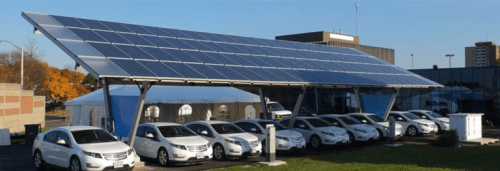
Palo Alto is aiming high by going low … carbon
The City of Palo Alto is pursuing a variety of strategies to meet its bold clean energy and greenhouse gas emissions goals.
While federal energy and climate policy is undoubtedly important, action is often driven at the local level. And innovative cities, like Palo Alto, California, are leading us into the clean energy future.
In April of this year, the City of Palo Alto passed an ambitious greenhouse gas (GHG) emissions reduction goal that will see an 80% reduction of GHG below 1990 levels by 2030. This municipal goal complements and accelerates California’s groundbreaking Assembly Bill 32 (AB 32), also known as the California Global Warming Solutions Act of 2006, which called for an 80% reduction of GHG emissions below 1990 levels by 2050. In September, the State of California, under the leadership of Governor Jerry Brown and the California Air Resources Board, updated AB 32 with Senate Bill 32, which includes the interim goal of reducing GHG emissions 40% below 1990 levels by 2030. While California is impressively increasing its ambitions, the City of Palo Alto is staging to get twice those results.
The City of Palo Alto is pursuing a variety of strategies to meet its bold clean energy and GHG emissions goals. Since 2015, the City’s entire electricity supply has been covered by carbon neutral sources, including hydropower. The City offsets power from any remaining carbon emitting sources by purchasing Renewable Energy Credits. With the costs of renewable energy steadily dropping, the City is continuing to increase the amount of solar in its portfolio. According to Pat Burt, Mayor of Palo Alto, theCity was able to contract for future solar powerat 3.7 cents per kilowatt-hour (kWh), not including about 3 additional cents per kWh to cover the anticipated costs of transmission.
Palo Alto has a specific focus on expanding its local renewable energy capacity with a goal of providing 4% of its total electric energy consumption from local solar by 2020. Working in close partnership with the city officials and staff at City of Palo Alto Utilities, the Clean Coalition helped design a feed-in tariff program, known as Palo Alto CLEAN, to support local solar installations. Under Palo Alto CLEAN, a standardized power purchase agreement (PPA) streamlines the process for selling local renewables to the utility at a fixed rate for up to 25 years. Importantly, this program made it possible to contract for solar canopies totaling 1.3 megawatts atop four City-owned parking structures. Net energy metering was not viable at these sites, since the parking structures have tiny loads and net energy metering does not allow annual generation to significantly exceed site load.
“Palo Alto CLEAN standardizes the process for selling local renewable energy to the utility and overcomes all of the challenges associated with load size, property ownership, and multi-tenancy,” said Ed Shikada, Assistant City Manager and Interim Director of Utilities. “Now that the first round of City-owned properties are successfully contracted, future projects can leverage the deal structure and associated contract documentation to facilitate far easier experiences. Ultimately, the solar parking structures are a key milestone and provide a showcase for more projects in Palo Alto and far beyond.”
In addition to its aggressive pursuit of renewable energy, the City of Palo Alto is also working to support wider adoption of electric vehicles (EV) and switching from natural gas appliances to electric appliances. As part of the deal to bring the solar canopies to the City-owned parking structures, Palo Alto was able to significantly advance its EV goals by having the project developer install, at no cost to the City, 18 Level-2 EV chargers and lay the wiring for an additional 80 charging stations.
In the latest example of Palo Alto leadership, the Palo Alto City Council unanimously approved the Carbon Neutral Natural Gas Plan this month.The planfurther supports Palo Alto’s clean energy and GHG goals by levying an increased charge, of no greater than 10 cents per therm, on natural gas usage. The money raised through this plan will help the City continue to reduce its reliance on fossil fuels through offsets, as well as through legal and programmatic options for investing in local electrification projects, such as the use of EVs for municipal fleets and incentivizing broad community adoption of more energy efficient electric appliances like heat pumps, induction cooktops, and electric dryers. The total cost of the natural gas charge translates to an additional $3.58 per month on a typical household’s utility bill – a negligible price for supporting the clean energy future.
The Clean Coalition is building upon this innovative work in Palo Alto through our latest initiative. The Peninsula Advanced Energy Community (PAEC) is a groundbreaking initiativeto streamline policies and showcase projects that facilitate local renewables and other advanced energy solutions like energy efficiency, energy storage, and electric vehicle charging infrastructure. The PAEC will create pathways to cost-effective clean local energy and community resilience throughout San Mateo County and the City of Palo Alto; and beyond. The PAEC is a collaboration between the Clean Coalition, the California Energy Commission, Pacific Gas and Electric, and an array of municipalities, emergency response jurisdictions, schools and universities, and corporate entities.
The Peninsula Advanced Energy Community (PAEC) is a groundbreaking initiativeto streamline policies and showcase projects that facilitate local renewables and other advanced energy solutions like energy efficiency, energy storage, and electric vehicle charging infrastructure. PAEC will create pathways to cost-effective clean local energy and community resilience throughout San Mateo County and the City of Palo Alto; and beyond. PAEC is a collaboration between the Clean Coalition, the California Energy Commission, Pacific Gas and Electric, and an array of municipalities, emergency response jurisdictions, schools and universities, and corporate entities.For more information, please visitwww.clean-coalition.org/PAEC.

